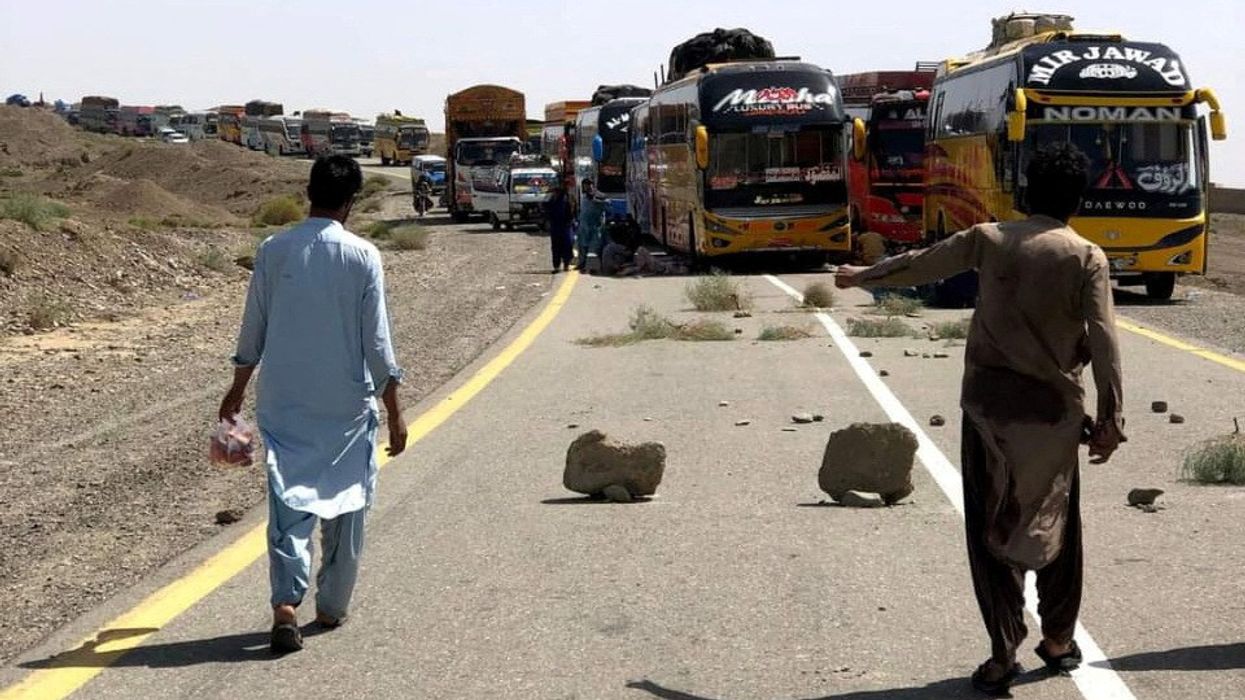AT LEAST 73 people were killed in Pakistan's Balochistan province when separatist militants attacked police stations, railway lines, highways, and security forces responded with retaliatory operations, officials said on Monday.
These attacks are considered among the most widespread in recent years by ethnic militants who have been fighting a long-standing insurgency to achieve secession for the resource-rich southwestern province. Balochistan is home to major China-led projects, including a port and a gold and copper mine.
Pakistan's interior minister Mohsin Naqvi said, "These attacks are a well thought-out plan to create anarchy in Pakistan."
According to Pakistan's military, 14 soldiers and police, along with 21 militants, were killed in the largest of the attacks, which targeted buses and trucks on a major highway.
Balochistan's chief minister reported that 38 civilians were also killed. Local officials noted that 23 of them died in a roadside attack after armed men checked passengers' IDs before shooting many and setting vehicles on fire.
"People were taken off buses and killed in front of their families," chief minister Sarfraz Bugti said during a televised press conference.
Following the blasts on a rail bridge connecting Quetta to the rest of Pakistan, rail traffic with the provincial capital was suspended. Militants also attacked a rail link to neighboring Iran, as confirmed by railways official Muhammad Kashif.
Police reported discovering six unidentified bodies near the site of the railway bridge attack.
Officials also stated that militants targeted police and security stations in Balochistan, killing at least 10 people in one of the attacks.
The Baloch Liberation Army (BLA), an armed militant group, claimed responsibility for the operation, which they called "Haruf" or "dark windy storm." In a statement to journalists, they claimed more attacks over the past day, which have not yet been confirmed by authorities.
The group mentioned that four suicide bombers, including a woman from the southern port district of Gwadar, were involved in an attack on the Bela paramilitary base. While Pakistani authorities did not confirm the suicide blasts, the provincial chief minister reported that three people were killed at the base.
The BLA is the largest of several ethnic insurgent groups fighting the central government, accusing it of unfairly exploiting the province's gas and mineral resources, leading to widespread poverty. The group seeks the expulsion of China and independence for Balochistan.
The attacks coincided with the anniversary of the death of Baloch nationalist leader Akbar Bugti, who was killed by Pakistan's security forces in 2006.
Pakistan prime minister Shehbaz Sharif pledged that security forces would retaliate and bring those responsible to justice.
Chief minister Bugti indicated that more intelligence-based operations would be launched to eliminate militants. He also suggested curtailing mobile data services to disrupt militant coordination.
"They launch attacks, film it, and then share it on social media for propaganda," he said.
General Li Qiaoming, commander of China's People's Liberation Army Ground Forces, met with Pakistan's army chief Asim Munir on Monday, though a Pakistani military statement released after the meeting did not mention the attacks.
European Commission spokesperson Nabila Massrali condemned the attack on behalf of the EU.
On Sunday night, armed men blocked a highway, ordered passengers off vehicles, and shot them after checking their identity cards, according to senior superintendent of police Ayub Achakzai.
As many as 35 vehicles were set on fire on the highway in the Musakhail area.
"The armed men not only killed passengers but also killed the drivers of trucks carrying coal," said Hameed Zahir, deputy commissioner of the area.
Militants have previously targeted workers from Pakistan's eastern province of Punjab, whom they accuse of exploiting their resources. They have also attacked Chinese interests and citizens in the province, where China operates the deepwater port of Gwadar and a gold and copper mine in its west.
The BLA claimed its fighters targeted military personnel traveling in civilian clothes. Pakistan's interior ministry stated that the dead were innocent citizens.
Six security personnel, three civilians, and one tribal elder were among those killed in clashes with armed militants who stormed a Balochistan Levies station in the central district of Kalat, according to police official Dostain Khan Dashti.
Officials reported attacks on police stations in two southern coastal towns, but the casualty toll has yet to be confirmed.
(With inputs from Reuters)




